
Cheshier Lab Members
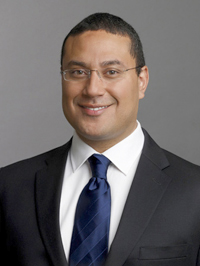 |
Sam Cheshier, MD, PhD Assistant Professor of Neurosurgery and, by courtesy, of Neurology at the Lucile Packard Children's Hospital Tashia and John Morgridge Faculty Scholar |
Dr. Cheshier is an Assistant Professor of Pediatric Neurosurgery and has practiced at Lucile Packard Children’s Hospital at Stanford for 3 years. His surgical practice includes a strong emphasis on pediatric tumors of the brain and spine. Dr. Cheshier performed his undergraduate studies at University of California Los Angeles, where he graduated with a degree in psychologybiology, summa cum laude, phi beta kappa. Afterward, Dr. Cheshier attended medical school at Stanford University enrolled in the Medical Scientist Training Program. During this time he earned a Ph.D. conducting basic science research on how stem cells grow. He performed his neurosurgical residency at Stanford University Hospital and Clinics. After his residency, Dr. Cheshier studied mid-brain stem cells and embryonic stem cells at Lund University in Sweden as part of a Van Wagenen Fellowship, which is the most prestigious research fellowship awarded to a graduating neurosurgeon. He then performed a pediatric neurosurgery fellowship at the Hospital for Sick Children in Toronto, Ontario. Since joining the faculty at Stanford, Dr. Cheshier has performed numerous surgeries on children with brain and spinal cord tumors. He also conducts basic science research, with the goal of translating experiments into therapies for malignant-pediatric brain tumors.
Research scientists
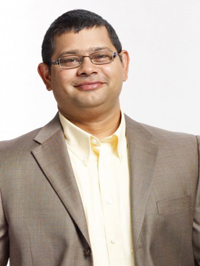 |
Siddhartha Mitra Joint senior scientist with Irv Weissman |
Siddhartha “Sid” Mitra got his baccalaureate and masters degree from the Department of Biophysics Honors school program, Panjab University in India and graduated with a MS/PhD from SUNY Buffalo in 2005 from Bruce Nicholson’s lab where he studied the signaling crosstalk between receptor and non-receptor tyrosine kinases and gap junctions. He did his postdoctoral training in Michael Ferns’s lab at University of California, Davis in cellular neuroscience and in Albert Wong’s lab at Stanford University in brain tumor biology. Following that he continued his research as a staff scientist in Dr. Irving Weissman’s lab and has since been spearheading the research in human brain tissue derived neural stem cells and brain tumor stem cell in Drs Weissman and Cheshier’s laboratory. He has been working on the identification of new cancer stem markers and signaling pathways in Adult and pediatric brain tumors to develop novel treatments of brain tumors using antibody therapeutics and development of antibody delivery systems to the brain.
He is the research team leader for the development of anti-CD47 treatment against adult and pediatric brain tumors and also part of the team developing clinical protocols for extending anti-CD47 treatment for non-CNS childhood cancers.
Visiting Scholar
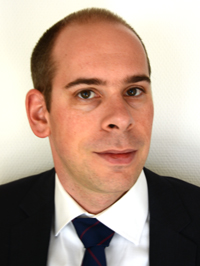 |
Gregor Andrea Hutter, MD, PhD Gregor graduated from the University of Zurich, Switzerland in 2008. His PhD project focussed on the immunology of prion diseases. He then completed his neurosurgery residency in Basel and Lucerne with Swiss board certification in 2013 and worked as an attending neurosurgeon in Lucerne, Switzerland. In November 2014, Gregor joined the Cheshier lab to study tumor-associated microglia and macrophages in malignant brain tumors as well as their therapeutic modulation. |
Postdoctoral fellows
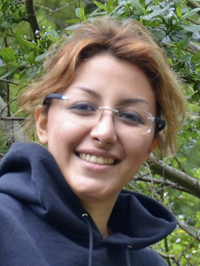 Sharareh Gholamin, MD Postdoctoral Fellow (2011 - ) |
Sherri graduated from Shahid Beheshti School of Medicine (Tehran, Iran) in 2010. As a postdoctoral fellow, her primary work focuses on use of the novel monoclonal antibody agent, anti-CD47, in the treatment of childhood brain tumors, particularly through in vivo murine modeling of pediatric glioblastoma, medulloblastoma, and other tumors. Phase I human clinical trials using the agent are scheduled to begin in 2014. Additional research interests include use of anti-CD47 with adjuvant chemotherapeutic agents and characterization of neurogenic-astrogenic switch in normal neural stem cells. Following her postdoctoral work, Sherri intends to pursue a career in pediatric neurology with a focus of medulloblastoma immunotherapy. |
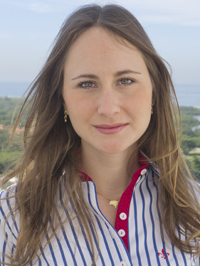 Suzana Kahn |
Medulloblastomas are malignant brain tumors that originate in the cerebellum in children and spread via the cerebrospinal fluid to the leptomeningeal spaces of the brain and spinal cord. Due to the poor prognosis for patients with metastatic dissemination, treatment protocols involve surgery, craniospinal radiation, and high-dose chemotherapy, that frequently cause disabling neurotoxic effects in long-term survivors. The tight relationship between metastasis and poor prognosis for medulloblastoma patients reinforces the need to understand the cellular determinants of leptomeningeal dissemination. Our goal, therefore, is to identify the signaling pathways involved in medulloblastoma metastasis to further target specific cellular components. |
Medical and graduate Students
 Rogelio Esparza, B.A. Molecular Biology, Neuroscience (Princeton University) |
Currently, my work involves the development of noninvasive measurements of immunologic responses to neuro-oncogenic immunotherapies. I also assist our postdoctoral members with establishment and maintenance of their medulloblastoma and glioblastoma xenograft mouse models. |
|
Abdullah is currently a fourth-year medical student at the Stanford School of Medicine with current active interests involving glioma immunotherapy (anti-CD47 therapy) and the role of mitochondrial dysregulation in central nervous system malignancies. He received funding from the American Brain Tumor Association and American Association of Neurological Surgeons in 2012 for his work in the lab on neural stem cell engraftment and differentiation. He intends to pursue a career in pediatric neurosurgery. |
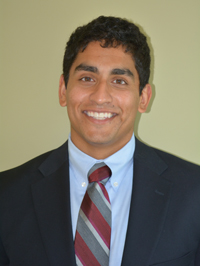 Tej Deepak Azad |
Tej Azad is a second-year Stanford medical student who graduated summa cum laude from Washington University in St. Louis in 2013. Tej is interested in leveraging computational techniques to better understand the interaction between the human nervous and immune systems. He aspires to become a pediatric neurosurgeon and data scientist, working to discover immune-mediated therapies and translate such solutions to patients with CNS tumors. Tej serves as a fellow of the American Brain Tumor Association and the Haas Center for Public Service |
Michael Zhang
Cheshier lab Alumni
Erin Ostby, MD student (University of Nevada School of Medicine)
Stephen Wakulchik, Postbac student
Amir Bolandparvaz, Undergrad (University of California, San Diego)
Vanessa Ho, Undergrad (Pomona College)
Achol Achrol, MD
Skender Najibi, BS
Arif Gilani, BS
Chelsea Yu

